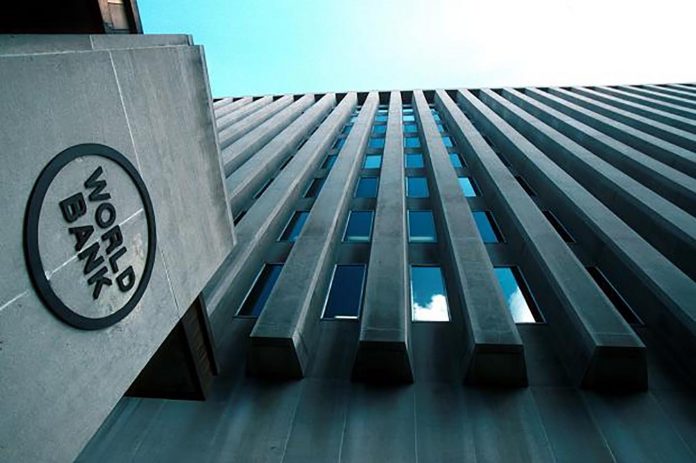–Containment measures, impact of pre-pandemic monetary and fiscal tightening cited as key reasons for restrained growth in Pakistan
–Global economic prospects report stresses collective measures for robust, sustainable and equitable growth
ISLAMABAD: Taking stock of the dwindling economic situation due to the coronavirus pandemic, the World Bank has forecast Pakistan’s growth rate at 0.5 per cent financial year 2020-21.
In its report titled “2021 Global Economic Prospects”, the World Bank has estimated that Pakistan’s growth rate contracted by 1.5 per cent during the last financial year due to the effects of measures taken by the government to curb the spread of coronavirus, as well as the impact of monetary and fiscal tightening prior to the pandemic.
The report states that the real interest rates were moved into the negative territory because of reduction in policy rate – 250 BPS on average and 625 BPS in Pakistan.
Acknowledging the steps taken to ensure the usage of formal channels for transferring remittances, the report states that inflow remained robust in 2020 with Pakistan and Bangladesh experiencing double-digit growth in this sector due to the usage of said channels, government incentives and the return of migrant workers.
The World Bank said that Pakistan, India and Bangladesh’s current accounts were positively affected by the inflows during the said period, besides international assistance, which helped several regional economies increase their foreign reserves.
As for economic recovery, the report states that Pakistan is expected to experience as restrained growth – averaging 1.3 per cent over the next two years – which is slightly better than previously expected, but far below the growth potential. Continued fiscal consolidation pressures and the weaknesses of the services sector are among the factors that could subdue Pakistan’s economic growth. Explaining its projection, the World Bank states that the outlook is predicted on Pakistan maintaining reform momentum, and its adherence to a macroeconomic-sustainability framework.
The report also cautions against limited prospects for a strong rebound in the services sector, which would result in aggravating poverty in the country, given that the sector represents half of Pakistan’s output and is an important financial source for low-income households.
Talking about the regional situation, the report, while excluding India, states that economic growth would slow to 0.9 per cent in 2021, with Pakistan, Afghanistan and Maldives taking the largest hit.
Regarding the risk of debt distress, the World Bank states that several economies, including Pakistan, Sri Lanka and Maldives, are at high risk, and require decisive action to maintain macroeconomic stability. It also cautions against security-related uncertainties Pakistan, India, Afghanistan and Nepal, given how they could adversely affect the fragile economic situation.
The report goes on to project a broader picture of the global economy, stating that economic growth is projected to be subdued, with the global economic output expected to expand by 4 per cent. It also cites the risk of setbacks in containing the pandemic as a potential factor which could derail economic recovery. It projects growth in emerging markets and developing economies at 5 per cent, while stating that the output of these countries is expected to remain well below their pre-pandemic situation.
Regarding global debt, the World Bank states that the pandemic exacerbated the risk associated with the decade-long wave of debt accumulation, with debt levels reaching historic highs, thus making the global economy vulnerable to market stress.
Furthermore, the report projects that the pandemic is likely to be cause of realisation of long-expected slowdown in economic growth during the decade ahead of us. It stresses the role of policymakers in improving the likelihood of better growth outcomes, limiting the spread of the virus, providing relief to vulnerable segments in populations, and overcoming vaccine-related challenges.
Finally, the World Bank also highlights that weak fiscal positions are severely constraining support measures of governments in many countries, and emphasises the need for reforms to ensure robust, sustainable and equitable growth, while stressing that global cooperation is the key to addressing many of these challenges. It adds that the global community needs to act rapidly and forcefully to ensure that the ongoing debt wave does not lead to a string of debt crises in emerging markets and developing economies as was the case previously.





Good that at least forecast is positive. 😁
You again. Get Lost scumbag.
Muhammad Bhai, Gussa Kyon Karte Ho? BP Badh Jayegaa, Dimaag Aur Kharaab Ho Jayegaa. 😁
Bhai? You are not even fit to be my janitor. Cow worshipper.
Bro, don’t spin on Hindu/ Muslim. The cow as such is not worshiped in Hinduism but Nandi (Oxen) is. It is a ritual of Indus Valley of not wasting cow. Which is a precious source of regular food, fuel, medicine and clothing (leather). Our shared motherland teaches both of us symbiosis with nature and animals and not their destruction.
No need to kill the hen for eggs & cow for meat, which Jahils are doing since partition. Ask any Sheikh, Ahir, Chiniot of Sargodha/ Gujaranwala or Ghosi in Pak Punjab about it. Read sec. 2(k) & 3 of the Punjab Animal Slaughter Control Act, 1963 (Pakistan) and understand why animal slaughter on Mangalwaar (Tuesday) & Budhwaar (Wednesday) are banned even in Pak Punjab.
Please preserve your brain cells, whatever are left learning ‘Post Nabi Arabian Jahillya Culture’ of the Land of Pure. Well I am ready to be Janitor to remove garbage from your otherwise concrete cranium. 😁